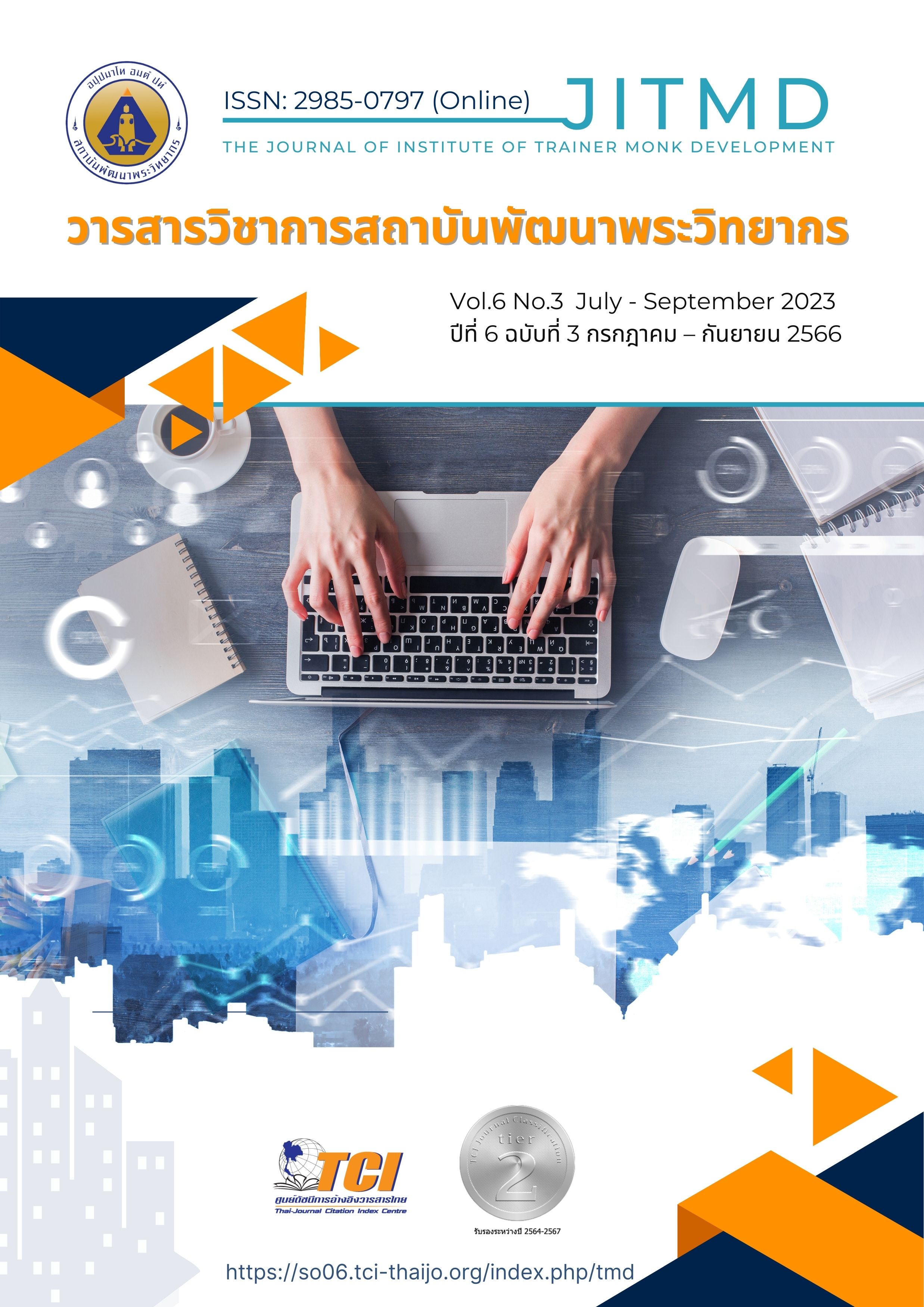การศึกษาผลการจัดกิจกรรมการเรียนรู้เรื่องอสมการเชิงเส้นตัวแปรเดียว โดยใช้เกมเป็นฐานของนักเรียนชั้นมัธยมศึกษาปีที่ 3 โรงเรียนท่ามะกาวิทยาคม จังหวัดกาญจนบุรี
Main Article Content
บทคัดย่อ
การวิจัยครั้งนี้มีวัตถุประสงค์ 1) เพื่อเปรียบเทียบผลสัมฤทธิ์ทางการเรียนวิชาคณิตศาสตร์ ก่อนเรียน ที่ได้รับจัดกิจกรรมการเรียนรู้โดยใช้เกมเป็นฐาน กับการจัดกิจกรรมการเรียนรู้แบบปกติ
2) เพื่อเปรียบเทียบผลสัมฤทธิ์ทางการเรียนวิชาคณิตศาสตร์ ก่อนเรียนและหลังเรียน ที่ได้รับจัดกิจกรรมการเรียนรู้โดยใช้เกมเป็นฐาน และการจัดกิจกรรมการเรียนรู้แบบปกติ 3) เพื่อเปรียบเทียบผลสัมฤทธิ์ทางการเรียนวิชาคณิตศาสตร์ หลังเรียน ระหว่างการจัดการเรียนรู้โดยใช้เกมเป็นฐาน
กับการจัดกิจกรรมการเรียนรู้แบบปกติ 4) เพื่อเปรียบเทียบความสามารถในการแก้ปัญหา หลังเรียน ระหว่างการจัดกิจกรรมการเรียนรู้โดยใช้เกมเป็นฐาน กับการจัดกิจกรรมการเรียนรู้แบบปกติ
5) เพื่อศึกษาความพึงพอใจ ต่อการจัดกิจกรรมการเรียนรู้โดยใช้เกมเป็นฐานของนักเรียนชั้นมัธยมศึกษาปีที่ 3 การวิจัยครั้งนี้เป็นการวิจัยรูปแบบการทดลองอย่างแท้จริง ผลการวิจัยพบว่า 1) ผลสัมฤทธิ์ทางการเรียนก่อนเรียน ไม่แตกต่างกันกับการจัดกิจกรรมการเรียนรู้แบบปกติ อย่างมีนัยสำคัญทางสถิติที่ระดับ 0.05 2) ผลสัมฤทธิ์ทางการเรียนวิชาคณิตศาสตร์โดยใช้เกมเป็นฐาน หลังเรียนสูงกว่าก่อนเรียน อย่างมีนัยสำคัญทางสถิติที่ระดับ 0.05 และผลสัมฤทธิ์ทางการเรียนวิชาคณิตศาสตร์ที่จัดกิจกรรมการเรียนรู้แบบปกติ หลังเรียนสูงกว่าก่อนเรียน อย่างมีนัยสำคัญทางสถิติที่ระดับ 0.05 3) ผลสัมฤทธิ์ทางการเรียนหลังเรียน ที่จัดกิจกรรมการเรียนรู้โดยใช้เกมเป็นฐาน สูงกว่าการจัดกิจกรรมการเรียนรู้แบบปกติ อย่างมีนัยสำคัญทางสถิติที่ระดับ 0.05 4) ผลสัมฤทธิ์ทางการเรียนวิชาคณิตศาสตร์หลังเรียน โดยใช้ความสามารถในการแก้ปัญหา ที่จัดกิจกรรมการเรียนรู้โดยใช้เกมเป็นฐาน สูงกว่าการจัดกิจกรรมการเรียนรู้แบบปกติ อย่างมีนัยสำคัญทางสถิติที่ระดับ 0.05 5) ความพึงพอใจของนักเรียนชั้นมัธยมศึกษาปีที่ 3 ต่อการจัดกิจกรรมการเรียนรู้โดยใช้เกมเป็นฐาน เรื่อง อสมการเชิงเส้นตัวแปรเดียว อยู่ในระดับมากที่สุด
Article Details

อนุญาตภายใต้เงื่อนไข Creative Commons Attribution-NonCommercial-NoDerivatives 4.0 International License.
บทความที่ได้รับการตีพิมพ์เป็นลิขสิทธิ์ของวารสารวิชาการสถาบันพัฒนาพระวิทยากร
ข้อความที่ปรากฎอยู่ในบทความที่ได้รับการตีพิมพ์ในวารสาร ถือเป็นความรับผิดชอบของผู้เขียนบทความ และข้อคิดเห็นนั้นไม่ถือว่าเป็นทัศนะและความรับผิดชอบของกองบรรณาธิการวารสารวิชาการสถาบันพัฒนาพระวิทยากร
เอกสารอ้างอิง
กระทรวงศึกษาธิการ. (2551). หลักสูตรแกนกลางการศึกษาขั้นพื้นฐาน พุทธศักราช 2551. กรุงเทพฯ: วัฒนาพานิช จำกัด.
ทิศนา แขมมณี. (2550). ศาสตร์การสอน องค์ความรู้เพื่อการจัดกระบวนการเรียนรู้ที่มีประสิทธิภาพ(5ed.). กรุงเทพมหานคร: สำนักพิมพ์แห่งจุฬาลงกรณ์มหาวิทยาลัย.
ธํารง บัวศรี. (2543). ทฤษฎีหลักสูตร: การออกแบบและพัฒนา. (พิมพ์ครั้งที่ 2). กรุงเทพมหานคร: ธนธัชการพิมพ์.
ประหยัด จิระวรพงศ์. (2555). Games Based Learning (เกมการศึกษา). กรุงเทพฯ: มหาวิทยาลัย ศรีนครินทรวิโรฒประสานมิตร.
ยุพิน พิพิธกุล. (2545). การเรียนการสอนคณิตศาสตร์ยุคปฏิรูปการศึกษา. กรุงเทพฯ: บพิธการพิมพ์.
สถาบันทดสอบทางการศึกษาแห่งชาติ (องค์การมหาชน). (2561). ค่าสถิติพื้นฐานของผลการทดสอบทางการศึกษาระดับชาติขั้นพื้นฐาน (O-NET) ปีการศึกษา 2560-2562. สืบค้นข้อมูลเมื่อ 1 พฤษภาคม 2561 จาก http:/www.niets.or.th.
สิริพร ทิพย์คง. (2545). หลักสูตรและการสอนคณิตศาสตร์. กรุงเทพฯ: บริษัทพัฒนาคุณภาพวิชาการ (พว.)จำกัด.
Mellander, K. (1993). The power of learning. United States of America: RR Donnelley & Sons Company.
Sakul Suksiri. (2007). The Study of Effectiveness of Game Based Learning Approach. Master of Science. Human Resource and Organization Development. NIDA, Bangkok.
Zepke, N., & Leach, L. (2010). Improving student engagement: Ten proposals for action. Active Learning in Higher Education, (11)(3): 167–177.


